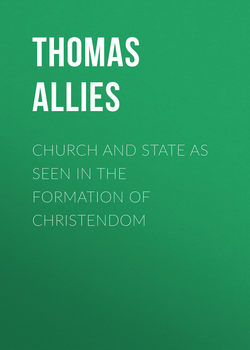Church and State as Seen in the Formation of Christendom

Реклама. ООО «ЛитРес», ИНН: 7719571260.
Оглавление
Allies Thomas William. Church and State as Seen in the Formation of Christendom
PROLOGUE
CHAPTER I
CHAPTER II
CHAPTER III
CHAPTER IV
CHAPTER V
CHAPTER VI
CHAPTER VII
CHAPTER VIII
Отрывок из книги
In one of the most ancient books of the world, which, in addition to its antiquity, all Christians venerate as containing the original tradition of man’s creation, guaranteed in purity and accuracy by divine assistance given to the writer, we read the following words: – “God made the beasts of the earth according to their kinds, and cattle, and everything that creepeth on the earth after its kind. And God saw that it was good. And he said: Let us make man to our image and likeness: and let him have dominion over the fishes of the sea, and the fowls of the air, and the beasts, and the whole earth, and every creeping creature that moveth upon the earth. And God created man to his own image: to the image of God he created him: male and female he created them.” And further: “The Lord God formed man of the slime of the earth; and breathed into his face the breath of life, and man became a living soul… And the Lord God took man and put him into the paradise of pleasure, to dress it and to keep it. And he commanded him, saying, Of every tree of paradise thou shalt eat; but of the tree of knowledge of good and evil thou shalt not eat. For in what day soever thou shalt eat of it, thou shalt die the death. And the Lord God said, It is not good for man to be alone; let us make him a help like unto himself. And the Lord God having formed out of the ground all the beasts of the earth, and all the fowls of the air, brought them to Adam to see what he would call them: for whatsoever Adam called any living creature, the same is its name. And Adam called all the beasts by their names, and all the fowls of the air, and all the cattle of the field; but for Adam there was not found a helper like himself. Then the Lord God cast a deep sleep upon Adam: and when he was fast asleep he took one of his ribs and filled up flesh for it. And the Lord God built the rib which he took from Adam into a woman: and brought her to Adam. And Adam said, This is now bone of my bones, and flesh of my flesh: she shall be called Woman, because she was taken out of man. Wherefore a man shall leave father and mother, and shall cleave to his wife: and they shall be two in one flesh. And they were both naked, Adam and his wife, and were not ashamed.”
Such is the account of the origin of man, of woman, of marriage, as the root of human society, and of that society itself, beginning in the absolute unity of one who was father and head of his race, created in full possession of reason and language, and exercising both by an intuitive knowledge of the qualities of living creatures as they are brought before him by his Maker. This account stands at the head of human history, and has been venerated as truth by more than a hundred generations of men since it was written down by Moses, not to speak of those many generations among whom it had been a living tradition before he had written it down. Human language scarcely possesses elsewhere such an assemblage of important truths in so few words. Perhaps the only parallel to it is contained in the fourteen verses which stand at the opening of St. John’s Gospel, wherein are recorded the Godhead and Incarnation of the Divine Word. The first creation has its counterpart only in the second; and the restoration of man by the personal action of God alone surpasses, or, perhaps, more truly may be said to complete, the Idea of his original formation by the same personal action of the same Divine Word, who, great as He is in creating, is yet greater in redeeming, but is one in both, and in both carries out one Idea.
.....
Over these unrecorded years of human life, which want their prophet and their bard, sounds yet the echo of perpetual strife. If mighty forms loom among their obscurity, and come out at length with fixed character and a strong and high civilisation, such as the Assyrian and Egyptian, the Indian and Chinese monarchies, and so many others of more or less extent and renown, we know that states have suffered change after change in a series of wars. The patriarchal ruler has given way to the conquering chief; conquest has humiliated some and exalted others. What remains intact in each country, and after all changes, is government itself. This carried on the human race.
But if we examine more closely this race which is thus scattered through all countries, which speaks innumerable tongues, has lost the sense of its own brotherhood, worships a multitude of local gods, is divided, cut up, formed again, and torn again with innumerable wars, and has degraded a large part of itself into servitude, so as to lose as it would seem all semblance of its original unity, we yet find running through it, existing from the beginning as constituent principles which the hand of the Creator has set in it, four great goods.
.....